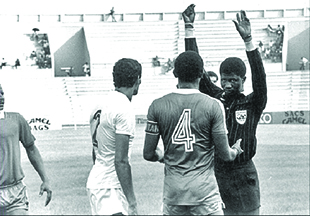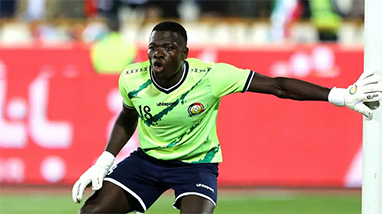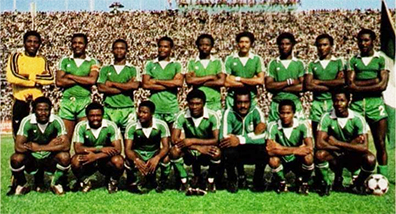AFCON
CAF fines Nigeria and Algeria for match-fixing –

BY KUNLE SOLAJA.
On this day, 40 years ago Nigeria and Algeria played their last Group B match in the Africa Cup of Nations in Bouake, Cote d’Ivoire. It remains one of the most controversial matches in the tournament’s history.
Nigeria won just one match in the series and yet came back with a silver medal.
Nigeria and Algeria played spinelessly to end tie at 0-0 fuelling allegations that both teams had agreed on an accord to eliminate defending champions, Ghana.
With players just knocking the ball about in the midfield and strikers even refusing to aim at goal, opting to kick the ball back into their territory, no one was left in doubt about the intentions of the 22 players on the pitch.
The ticket holding spectators were enraged.
So dismaying was the play that the Guinean referee, Karim Camara issued a yellow card to skippers Stephen Keshi of Nigeria and Ali Feghani of Algeria. The gesture was actually a general caution to both teams for ‘unsporting’ behaviour.
After three hours of deliberation, CAF fined Algeria and Nigeria $6,000. At the time, it was initially a subject of speculations on whether both team conspired. Sports Village Square can confirm that there were strong elements indicating match fixing.
A member of the squad, now deceased during a social gathering actually confessed to be at the centre of the deal after a chance meeting with Algeria’s captain, Ali Feghani whom he had known before.
The deal: “Nigeria-Algeria play 0-0; Ghana, Malawi go home”. Weeks later, Henry Nwosu, a member of the Nigerian squad granted an interview to the evening newspaper of The Guardian, Guardian Express, confirming the conspiracy.
From Algeria later came another confirmation.
A former Algeria midfielder Mohammed Shoaib revealed there was a connivance to get the defending champions, Ghana eliminated.
Going into the last match, Ghana, defeated in the opening match by Nigeria, needed to beat Malawi in their last group match in addition to expecting Nigeria to be beaten by Algeria.
Nigeria needed a draw to advance to the semi-final along with Algeria.
The Algerians recalled their own fate in the World Cup two years earlier in what was globally called the ‘Gijon Swindle’. At the time, West Germany and Austria, neighbours conspired to eliminate Algeria in a Spain ‘82 duel at Gijon.
Owing to the the tiebreaker rules in the group stage, a West German win by one or two goals would ensure that both Austria and West Germany advanced to the next round. West Germany scored the only goal in the first 10 minutes of the match, which progressively deteriorated to a virtual standstill in the second half.
Despite widespread condemnation and a formal complaint lodged by Algeria who bore the consequences, FIFA did not take any action.
Later, an Austrian player Reinhold Hintermaier admitted the match was fixed. That is the reason why group stage now ensures that the final two games in each group would be played simultaneously.
AFCON
Kenya keeper suspended amid match-fixing investigation

Kenya goalkeeper Patrick Matasi has been provisionally suspended from all football activity in the country for 90 days amid an investigation into allegations of match manipulation.
Football Kenya Federation (FKF) took the decision on Thursday evening, hours after the governing body announced it had launched an investigation into the 37-year-old.
The case arose after a video posted online appeared to show the keeper agreeing to a deal to influence the outcome of a game.
The BBC has not been able to verify the video, which is undated.
Matasi plays for Kenyan Premier League club Kakamega Homeboyz and has won over 30 international caps.
He has not responded to multiple requests for comment.
The owner of Kakamega Homeboyz, Cleophas Shimanyula, said that Matasi denied the allegations.
“He was shocked at what he was seeing in the video and he told me he doesn’t know about match-fixing,” Shimanyula told BBC Sport Africa.
“Kakamega Homeboyz is against any form of match manipulation.”
Matasi’s most recent appearance for Kenya came in a 2025 Africa Cup of Nations qualifier against Cameroon last October.
The Harambee Stars lost the game 4-1.
The FKF said it would work with world governing body FIFA, the Confederation of African Football and other “relevant authorities” during its investigation.
-BBC
Follow the Sports Village Square channel on WhatsApp: https://whatsapp.com/channel/0029Vaz7mEIGk1FxU8YIXb0H
AFCON
Kenyan Federation opens investigation into suspected match-fixing in AFCON 2025 Qualifiers

The Kenya Football Federation (KFF) has decided to investigate suspicions of match-fixing by the national team against Cameroon in the 2025 Africa Cup of Nations qualifiers
The FKF has confirmed that it is aware of videos circulating online involving Kenyan goalkeeper Patrick Matasi, raising suspicions of possible match manipulation.

Prime suspect, Patrick Matasi, the Kenyan goalkeeper.
This amateur video, filmed in secret and viewed by AFP, shows a man discussing with Matasi a plan to fix a match in exchange for money.

Press statement by Football Kenya Federation.
” The FKF defends the integrity of football and has launched an official investigation, in collaboration with FIFA, CAF and other relevant authorities,” the federation said in a statement.
” We reaffirm our policy of tolerance regarding match manipulation and we are committed to preserving the credibility of our competition,” she insisted.
The match in question was lost 4-1 by Kenya to Cameroon in Yaoundé last October, destroying the Harambee Stars’ chances of qualifying for the finals in Morocco next December-January and leading to the resignation of the then coach, Engin Firat.
Matasi has since been omitted from the squad by new coach Benni McCarthy for the 2026 World Cup qualifiers against Gambia and Gabon in Group F on March 20 and 23.
-Le360 / AFP
Follow the Sports Village Square channel on WhatsApp: https://whatsapp.com/channel/0029Vaz7mEIGk1FxU8YIXb0H
AFCON
How time flies? It’s 45 years since Nigeria’s first AFCON glory

It is 45 years since Nigeria first tasted victory in the Africa Cup of Nations in Lagos.
That was March 22, 1980, when Nigeria beat Algeria 3-0 in the final match to lift an Organization of African Unity (OAU)-donated trophy which was the replacement of the original trophy that Ghana had won for keeps after three victories.
The new trophy was tagged the ‘Unity Cup’. Christian Chukwu, Nigeria’s skipper, later voted as the best player of the tournament, became the first footballer to lift the trophy.
It was Nigeria’s biggest achievement in football at the time.
The feat of the 1980 class of Nigeria’s national football team opened a new chapter for Nigerian football and inspired generations of younger players to excel on the field of play.
It was the first time Nigeria featured in the title match. Nigeria went on to play seven more final matches and succeeded in two of such in 1994 and 2013.
Sadly, some of the heroes of 1980 are no more. Those who have passed on include Best Ogedegbe who was in goal, Muda Lawal, the scorer of the final goal, Okey Isima, Tunde Bamidele, Aloysius Atuegbu and Martin Eyo.
Thus only 14 of the 20 heroes of 1980 are alive. Even the coach, Brazil’s Professor Otto Gloria, has passed on.
That probably prompted one of the heroes, Felix Owolabi, whose solitary goal against Morocco in the semi-final launched Nigeria into the title match, to express gratitude to God for keeping him alive.
In a message to Sports Village Square, Owolabi who clocked 70 last September 24, remarked: “Today is exactly 45 years since Nigeria won the African Cup of Nations for the first time.
“The National Team at that time “Green Eagles” made Nigeria proud. Thank God today I am celebrating this day with a special prayer because I belong to that historic team.
“Kindly help me thank God.1980, became the real tonic for my football career as also an undergraduate at the University of Lagos
They not only arrested the attention of world football, but they also opened opportunities for others to pursue professional football.
“A big congratulations to all members of that great team for winning the Nations Cup for the first time on home soil. Their achievement brings fond memories to us about the never-say-die Nigerian spirit.”
The 22-man squad of 1980 are: Best Ogedegbe, David Adiele, Okey Isima, Muda Lawal, Christian Chukwu, Tunde Bamidele, Segun Odegbami, Aloysius Atuegbu, Ifeanyi Onyeadika, John Orlando, Felix Owolabi, Adokie Amiesimaka, Godwin Odiye, Sylvanus Okpala, Emmanuel Okala, Martins Eyo, Moses Effiong, Sheffiu Mohammed, Charles Bassey, Frank Onwuachi, Henry Nwosu and Kadiri Ikhana.
Follow the Sports Village Square channel on WhatsApp: https://whatsapp.com/channel/0029Vaz7mEIGk1FxU8YIXb0H
-

 OBITUARY3 days ago
OBITUARY3 days agoA burden of debts pushed dead Nigerian boxer, Segun Olanrewaju, to the fatal fight
-

 World Cup1 week ago
World Cup1 week agoFifth-placed Lesotho protests South Africa’s fielding of ineligible players
-

 World Cup1 week ago
World Cup1 week agoWorld Cup 2026 is a ‘Mission Impossible’ for Super Eagles
-

 World Cup1 week ago
World Cup1 week agoWorld Cup match forfeiture looms for South Africa
-

 ESSPORT6 days ago
ESSPORT6 days agoMillionaire emerges from the Bet9ja UCL jackpot campaign
-

 OBITUARY4 days ago
OBITUARY4 days agoNigerian Boxer Segun Olanrewaju Dies in Ghana Match
-

 World Cup1 week ago
World Cup1 week agoSerial offenders! Libya aiding Sudan to frustrate South Sudan in Libya
-

 NATIONAL SPORTS FESTIVAL1 week ago
NATIONAL SPORTS FESTIVAL1 week agoPresident Bola Ahmed Tinubu to Flag Off Unity Torch Movement Ahead of 22nd National Sports Festival



